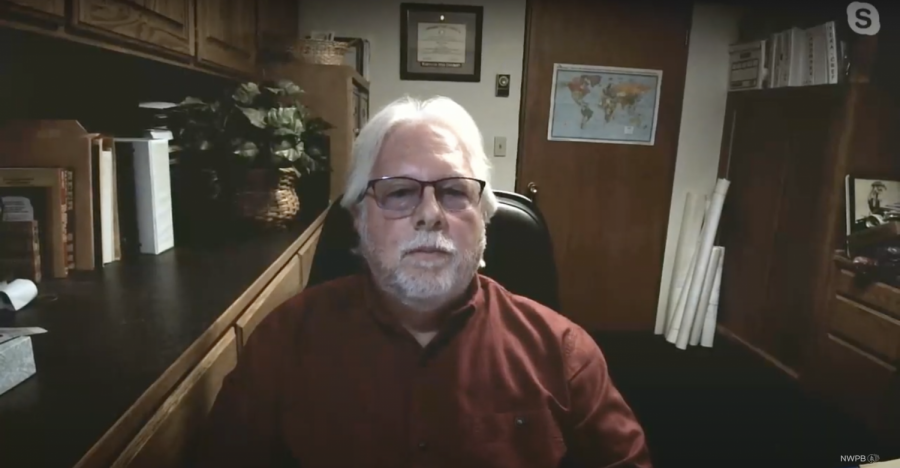- Agriculture
- COVID-19
- Environment
- Local
- Local elections
- Marijuana
- News
- Politics
- Pullman Community
- TOP FEATURES
- Whitman County
County candidates debate on COVID-19 response, small business assistance
Kinzer, Handy disagree on weed farming in county
Tom Handy, who is running against incumbent Dean Kinzer for Whitman County commissioner, said he believes the county has a responsibility to provide grant assistance to allow businesses to thrive.
September 25, 2020
Candidates for the Whitman County Commission debated Thursday night about the county’s role in handling the pandemic, support of small businesses and developing long-term plans for rebuilding towns impacted by the Washington state fires.
Incumbent Dean Kinzer and business owner Tom Handy answered each other’s and the public’s questions about these topics during the live-streamed debate from Northwest Public Broadcasting.
County response to COVID-19
Handy said the county and local community residents knew that students returning to Pullman would cause a resurgence in positive coronavirus cases. The county health department’s response was the best it could be considering the circumstances, Handy said.
Kinzer agreed with Handy, saying the county worked to protect and minimize infection rights amongst the most vulnerable populations.
“We had discussed that thoroughly,” Kinzer said. “We were pretty cognizant that we would have a high return when students came back.”
Long-term budget plans
Kinzer said during his time as commissioner he recommended that the county set aside at least two months of reserve funds. This generated about $2.7 million in emergency reserve funds for the county, he said, which was valuable for the longevity of the county’s economic development.
“We started off with basically nothing when I was elected, and it took a long time because the county was not in a good fiscal position at that time,” Kinzer said.
Handy did not disagree with the sentiment but said he hoped the reserves would be enough considering some of the challenges posed by the pandemic and the fires in Whitman County.
“I would like to see a little bit more growth potential within the county,” Handy said.
In terms of generating new revenue for Whitman County, Handy said one of the most effective methods is to draw more people out of the cities and into the rural towns.
“We need to make it easier to do business in Whitman County,” Handy said.
Kinzer did not disagree, but said the county commission is specifically looking at converting some government departments into “enterprise departments.” This means fees and taxes on certain services will help the county make more money.
For example, solid waste management charges a fee to those who drop their waste off at the county drop-off locations, Kinzer said. The fee for the county building inspector also helps maintain that position, he said.
“Increasing economic development is a priority,” he said.
Small business support
Handy said that as a small business owner who spent 30 years of his working life in Pullman, the county does have a responsibility to provide grant assistance to allow these businesses to thrive.
Pullman specifically saw the closures of many local business staples, with more indefinite shutdowns causing uncertainty for owners in the area.
“There are things that are happening on a daily basis that makes it more difficult for us to operate,” Handy said.
Kinzer said he serves on the Southwest Economic Association board, which worked to provide added county funding for small businesses.
The county worked to match funding from the Coronavirus Aid, Relief, and Economic Security Act, he said. Business owners could apply for grants of up to $10,000, and the county distributed nearly $240,000 to small businesses in rural areas, Kinzer said.
“These outlying communities are really struggling,” he said.
Whitman County fire effects
In regard to rebuilding towns impacted by fires, especially the town of Malden, which lost 80 percent of its infrastructure, both candidates said they wanted to convince the residents to return and help rebuild.
Kinzer said a county coordinator is in Malden to determine which buildings can be salvaged and where hazardous materials are. Federal funding will come in to help with the construction, he said, but the effects of emergency funds are not clear as of now.
“We’ve got multiple challenges there,” Kinzer said. “It’s going to stress the system a bit.”
Handy said there is no way to circumvent spending government money in order for the town of Malden to be rebuilt.
The county needs to determine the value of these smaller communities, so people want to return, he said.
“It’s going to take the will of the people in part to want to rebuild and want to live there,” Handy said.
Moratorium on marijuana farms
Handy said he supported the farming of marijuana with proper zoning classifications. Marijuana farms are business and will generate revenue for the county, he said.
“Why should we discriminate one farmer against another?” Handy said.
Kinzer said marijuana is not an agricultural crop and thus cannot be treated the same as growing crops like wheat or lentils. He said facilities need to devise plans to maintain the odor because they have the technology to do so.
“Let’s face it, the odor offends people,” Kinzer said.
Both candidates said they support the moratorium.











